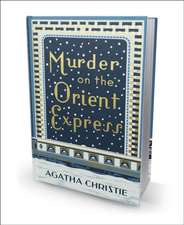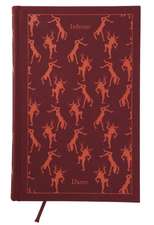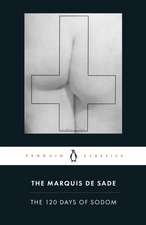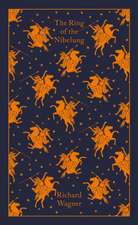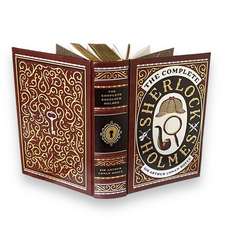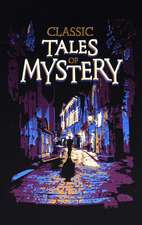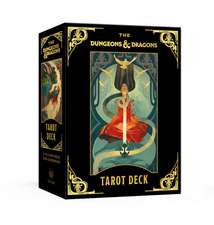Dracula: Classic Starts
Autor Bram Stokeren Limba Engleză Hardback – aug 2007 – vârsta de la 7 până la 9 ani
Vezi toate premiile Carte premiată
Benjamin Franklin Award (2013)
Dracula, that compelling creature of the night, continues his neck-biting ways in a version of the novel that children will devour. Moving from Transylvania to London, the timeless vampire serves up thrills and chills as he imprisons and terrorizes the innocent Jonathan Harker, and then goes after his fiancée, Mina, and her friend Lucy. From creepy, insect-eating Renfield to Dr. Van Helsing—who valiantly fights Dracula’s evil—the characters and drama are spellbinding.
| Toate formatele și edițiile | Preț | Express |
|---|---|---|
| Paperback (183) | 37.51 lei 3-5 săpt. | |
| Penguin Random House Group – 31 dec 2000 | 37.51 lei 3-5 săpt. | |
| Bantam Books – 31 oct 1983 | 37.92 lei 3-5 săpt. | |
| Vintage Publishing – 3 oct 2007 | 40.05 lei 22-33 zile | +18.13 lei 7-13 zile |
| Oxford University Press – 24 feb 2011 | 40.50 lei 11-16 zile | +18.90 lei 7-13 zile |
| Pan Macmillan – 5 sep 2024 | 44.60 lei 3-5 săpt. | +30.95 lei 7-13 zile |
| Penguin Books – 25 apr 2012 | 45.48 lei 22-33 zile | +20.22 lei 7-13 zile |
| – | 45.94 lei 3-5 săpt. | |
| Alma Books COMMIS – 14 sep 2015 | 46.81 lei 3-5 săpt. | +14.95 lei 7-13 zile |
| Vintage Publishing – 2 oct 2013 | 48.03 lei 22-33 zile | +30.59 lei 7-13 zile |
| Black Gas Publishing – 30 apr 2005 | 49.73 lei 22-33 zile | |
| Stone Arch Books – 30 iun 2014 | 49.88 lei 3-5 săpt. | |
| Real Reads – 26 ian 2009 | 50.43 lei 3-5 săpt. | +5.98 lei 7-13 zile |
| Arcturus Publishing – 15 iul 2016 | 51.78 lei 3-5 săpt. | +10.87 lei 7-13 zile |
| Aladdin – 26 sep 2024 | 52.54 lei 22-34 zile | +30.70 lei 7-13 zile |
| Penguin Books – 26 mar 2003 | 52.76 lei 3-5 săpt. | +14.46 lei 7-13 zile |
| Flame Tree Publishing – 30 mai 2018 | 53.58 lei 3-5 săpt. | |
| Simon&Schuster – 30 sep 2003 | 53.97 lei 3-5 săpt. | |
| UNION SQUARE & CO – 18 iul 2023 | 53.98 lei 3-5 săpt. | +24.00 lei 7-13 zile |
| – | 56.14 lei 3-5 săpt. | |
| Capstone Global Library Ltd – iul 2009 | 56.85 lei 3-5 săpt. | +7.08 lei 7-13 zile |
| Chicago Review Press Inc DBA Independ Pub Grp – 14 dec 2018 | 58.12 lei 3-5 săpt. | |
| HarperCollins Publishers – 22 iul 2021 | 58.37 lei 3-5 săpt. | +12.60 lei 7-13 zile |
| CreateSpace Independent Publishing Platform – | 58.63 lei 3-5 săpt. | |
| LEGEND PRESS – 31 mai 2019 | 59.23 lei 3-5 săpt. | +48.91 lei 7-13 zile |
| Penguin Random House Children's UK – 4 mar 2009 | 59.52 lei 3-5 săpt. | +16.80 lei 7-13 zile |
| Simon&Schuster – 3 dec 2014 | 64.92 lei 3-5 săpt. | +14.09 lei 7-13 zile |
| – | 65.44 lei 3-5 săpt. | |
| VINTAGE BOOKS – 31 mai 2011 | 69.48 lei 3-5 săpt. | |
| Klett Sprachen GmbH – 21 ian 2022 | 70.54 lei 18-23 zile | +6.55 lei 7-13 zile |
| – | 71.52 lei 3-5 săpt. | |
| CREATESPACE – | 72.60 lei 3-5 săpt. | |
| – | 74.34 lei 3-5 săpt. | |
| – | 74.63 lei 3-5 săpt. | |
| – | 74.63 lei 3-5 săpt. | |
| West Margin Press – 22 apr 2020 | 75.96 lei 3-5 săpt. | +13.99 lei 7-13 zile |
| – | 76.09 lei 3-5 săpt. | |
| Ignatius Press – 30 apr 2012 | 76.68 lei 3-5 săpt. | |
| CREATESPACE – | 79.28 lei 3-5 săpt. | |
| CREATESPACE – | 80.04 lei 3-5 săpt. | |
| Theatre Communications Group – feb 2010 | 80.61 lei 3-5 săpt. | +4.66 lei 7-13 zile |
| CREATESPACE – | 82.32 lei 3-5 săpt. | |
| – | 83.48 lei 3-5 săpt. | |
| CREATESPACE – | 83.54 lei 3-5 săpt. | |
| CreateSpace Independent Publishing Platform – | 83.64 lei 3-5 săpt. | |
| – | 90.47 lei 3-5 săpt. | |
| – | 90.75 lei 3-5 săpt. | |
| CreateSpace Independent Publishing Platform – | 92.30 lei 3-5 săpt. | |
| – | 92.30 lei 3-5 săpt. | |
| Klett Sprachen GmbH – 8 dec 2022 | 92.45 lei 18-23 zile | +8.59 lei 7-13 zile |
| CANTERBURY CLASSICS – 10 aug 2012 | 92.75 lei 3-5 săpt. | |
| Macmillan Learning – 6 apr 2016 | 92.96 lei 3-5 săpt. | +55.13 lei 7-13 zile |
| – | 93.41 lei 3-5 săpt. | |
| CREATESPACE – 30 iun 2010 | 96.15 lei 3-5 săpt. | |
| CreateSpace Independent Publishing Platform – 9 dec 2015 | 98.23 lei 3-5 săpt. | |
| – | 100.03 lei 3-5 săpt. | |
| CreateSpace Independent Publishing Platform – | 102.57 lei 3-5 săpt. | |
| – | 103.12 lei 3-5 săpt. | |
| CREATESPACE – | 105.00 lei 3-5 săpt. | |
| – | 105.02 lei 3-5 săpt. | |
| Broadview Press – 30 noi 1997 | 106.16 lei 3-5 săpt. | |
| CREATESPACE – | 106.37 lei 3-5 săpt. | |
| CREATESPACE – | 107.03 lei 3-5 săpt. | |
| Top Five Books, LLC – aug 2020 | 107.43 lei 3-5 săpt. | |
| CreateSpace Independent Publishing Platform – | 108.05 lei 3-5 săpt. | |
| CreateSpace Independent Publishing Platform – | 109.02 lei 3-5 săpt. | |
| CREATESPACE – | 110.92 lei 3-5 săpt. | |
| Restless Books – 2 noi 2022 | 111.83 lei 3-5 săpt. | +25.19 lei 7-13 zile |
| CREATESPACE – | 111.97 lei 3-5 săpt. | |
| – | 112.78 lei 3-5 săpt. | |
| – | 113.22 lei 3-5 săpt. | |
| www.bnpublishing.com – 6 mai 2012 | 115.24 lei 3-5 săpt. | |
| CreateSpace Independent Publishing Platform – | 115.46 lei 3-5 săpt. | |
| CreateSpace Independent Publishing Platform – | 116.59 lei 3-5 săpt. | |
| CreateSpace Independent Publishing Platform – | 116.93 lei 3-5 săpt. | |
| – | 117.42 lei 3-5 săpt. | |
| – | 118.01 lei 3-5 săpt. | |
| – | 119.39 lei 3-5 săpt. | |
| – | 120.09 lei 3-5 săpt. | |
| UNION SQUARE & CO – 27 mar 2015 | 120.96 lei 3-5 săpt. | +36.28 lei 7-13 zile |
| CREATESPACE – | 121.04 lei 3-5 săpt. | |
| – | 121.80 lei 3-5 săpt. | |
| CreateSpace Independent Publishing Platform – | 123.18 lei 3-5 săpt. | |
| CREATESPACE – | 124.41 lei 3-5 săpt. | |
| – | 126.28 lei 3-5 săpt. | |
| – | 128.21 lei 3-5 săpt. | |
| CREATESPACE – | 129.93 lei 3-5 săpt. | |
| – | 130.34 lei 3-5 săpt. | |
| – | 131.00 lei 3-5 săpt. | |
| CREATESPACE – | 133.55 lei 3-5 săpt. | |
| – | 135.01 lei 3-5 săpt. | |
| – | 135.85 lei 3-5 săpt. | |
| – | 136.64 lei 3-5 săpt. | |
| – | 138.13 lei 3-5 săpt. | |
| – | 139.42 lei 3-5 săpt. | |
| CREATESPACE – | 139.51 lei 3-5 săpt. | |
| CreateSpace Independent Publishing Platform – | 140.18 lei 3-5 săpt. | |
| – | 142.02 lei 3-5 săpt. | |
| Kallpa Publishing Inc. – 25 mar 2022 | 142.25 lei 3-5 săpt. | |
| G&D MEDIA – 19 mar 2024 | 142.26 lei 3-5 săpt. | |
| – | 142.26 lei 3-5 săpt. | |
| Shakespeare and Company Paris – 25 apr 2016 | 143.80 lei 3-5 săpt. | |
| – | 144.05 lei 3-5 săpt. | |
| – | 144.08 lei 3-5 săpt. | |
| Les prairies numériques – 6 iul 2020 | 146.03 lei 3-5 săpt. | |
| CreateSpace Independent Publishing Platform – | 147.38 lei 3-5 săpt. | |
| – | 147.90 lei 3-5 săpt. | |
| – | 147.96 lei 3-5 săpt. | |
| CREATESPACE – | 151.08 lei 3-5 săpt. | |
| CREATESPACE – | 151.94 lei 3-5 săpt. | |
| CREATESPACE – | 152.43 lei 3-5 săpt. | |
| CREATESPACE – | 155.85 lei 3-5 săpt. | |
| – | 165.69 lei 3-5 săpt. | |
| CreateSpace Independent Publishing Platform – | 167.98 lei 3-5 săpt. | |
| – | 170.73 lei 3-5 săpt. | |
| – | 171.42 lei 3-5 săpt. | |
| Penguin Books – 30 sep 2010 | 180.83 lei 3-5 săpt. | |
| CREATESPACE – 30 apr 2009 | 180.94 lei 3-5 săpt. | |
| – | 191.43 lei 3-5 săpt. | |
| CreateSpace Independent Publishing Platform – | 194.59 lei 3-5 săpt. | |
| CREATESPACE – | 195.34 lei 3-5 săpt. | |
| CREATESPACE – | 220.29 lei 3-5 săpt. | |
| – | 254.28 lei 3-5 săpt. | |
| Hansebooks – sep 2023 | 287.45 lei 3-5 săpt. | |
| – | 407.76 lei 3-5 săpt. | |
| Brolga Publishing – 2010 | 69.76 lei 18-23 zile | |
| KUPERARD (BRAVO LTD) – 18 apr 2001 | 75.47 lei 6-8 săpt. | |
| Broadway Play Publishing Inc – 3 mai 2022 | 82.04 lei 6-8 săpt. | |
| – | 86.58 lei 6-8 săpt. | |
| CREATESPACE – | 95.77 lei 6-8 săpt. | |
| Digireads.com – 10 noi 2015 | 99.13 lei 6-8 săpt. | |
| LIGHTNING SOURCE INC – 20 sep 2018 | 100.08 lei 18-23 zile | |
| – | 100.61 lei 6-8 săpt. | |
| COSIMO CLASSICS – 30 sep 2009 | 100.66 lei 6-8 săpt. | |
| OMNI Publishing – 21 dec 2019 | 104.40 lei 6-8 săpt. | |
| CreateSpace Independent Publishing Platform – | 104.46 lei 6-8 săpt. | |
| Toronto Public Domain Publishing – 10 mai 2020 | 105.85 lei 6-8 săpt. | |
| Susan Publishing Ltd – 10 mai 2020 | 105.85 lei 6-8 săpt. | |
| Mary Publishing Company – 10 mai 2020 | 105.85 lei 6-8 săpt. | |
| Camel Publishing House – 10 mai 2020 | 105.85 lei 6-8 săpt. | |
| USA Public Domain Books – 10 mai 2020 | 105.85 lei 6-8 săpt. | |
| Yorkshire Public Books – 10 mai 2020 | 105.85 lei 6-8 săpt. | |
| Texas Public Domain – 10 mai 2020 | 105.85 lei 6-8 săpt. | |
| Barclays Public Books – 10 mai 2020 | 105.85 lei 6-8 săpt. | |
| Public Publishing – 10 mai 2020 | 107.47 lei 6-8 săpt. | |
| Public Public Books – 10 mai 2020 | 107.47 lei 6-8 săpt. | |
| Suzeteo Enterprises – 21 oct 2012 | 109.34 lei 6-8 săpt. | |
| Serenity Publishers, LLC – 30 sep 2008 | 110.07 lei 39-44 zile | |
| – | 111.20 lei 6-8 săpt. | |
| CREATESPACE – 31 ian 2010 | 114.45 lei 6-8 săpt. | |
| CreateSpace Independent Publishing Platform – | 117.10 lei 6-8 săpt. | |
| – | 119.21 lei 6-8 săpt. | |
| LIGHTNING SOURCE INC – 22 sep 2018 | 120.04 lei 18-23 zile | |
| – | 120.20 lei 6-8 săpt. | |
| Benediction Classics – 31 dec 2011 | 121.36 lei 6-8 săpt. | |
| Laurelhurst – 25 aug 2013 | 122.48 lei 6-8 săpt. | |
| LIGHTNING SOURCE INC – 19 sep 2018 | 123.67 lei 18-23 zile | |
| LIGHTNING SOURCE INC – 8 oct 2018 | 123.67 lei 18-23 zile | |
| LIGHTNING SOURCE INC – 11 oct 2018 | 123.67 lei 18-23 zile | |
| Editorium – 30 sep 2009 | 129.50 lei 6-8 săpt. | |
| – | 131.89 lei 6-8 săpt. | |
| Hawk Press – 4 iun 1996 | 132.76 lei 6-8 săpt. | |
| Indoeuropeanpublishing.com – 5 ian 2024 | 134.38 lei 6-8 săpt. | |
| OMNI Publishing – 11 iul 2019 | 138.98 lei 6-8 săpt. | |
| Tui – 30 apr 2010 | 143.64 lei 39-44 zile | |
| Alan Rodgers' Books – 31 mar 2005 | 144.75 lei 6-8 săpt. | |
| Stonewell Press – 19 oct 2013 | 147.21 lei 6-8 săpt. | |
| University of British Columbia Press – 29 feb 2016 | 150.07 lei 6-8 săpt. | |
| Bibliotech Press – 4 feb 2012 | 150.34 lei 6-8 săpt. | |
| MiraVista Interactive – 25 mai 2019 | 151.95 lei 39-44 zile | |
| Antiquarius – 18 oct 2020 | 152.87 lei 39-44 zile | |
| ImTheStory – 19 oct 2015 | 163.03 lei 39-44 zile | |
| NMD Books – 31 dec 2010 | 164.64 lei 6-8 săpt. | |
| CREATESPACE – | 170.95 lei 6-8 săpt. | |
| Throne Classics – 24 mai 2019 | 174.85 lei 39-44 zile | |
| RUPA – 15 ian 2021 | 179.16 lei 39-44 zile | |
| Simon & Brown – 31 mar 2011 | 192.86 lei 39-44 zile | |
| Lulu.Com – 26 feb 2018 | 199.12 lei 6-8 săpt. | |
| Delhi Open Books – 11 iun 2020 | 206.24 lei 6-8 săpt. | |
| LIGHTNING SOURCE INC – 3 iul 2018 | 230.46 lei 18-23 zile | |
| Echo Library – 30 iul 2003 | 231.69 lei 39-44 zile | |
| – | 249.61 lei 6-8 săpt. | |
| Echo Library – 30 apr 2006 | 271.72 lei 39-44 zile | |
| Cambridge University Press – 2 ian 2013 | 370.43 lei 6-8 săpt. | |
| Hardback (29) | 38.54 lei 3-5 săpt. | +14.75 lei 7-13 zile |
| Sterling Publishing (NY) – aug 2007 | 38.54 lei 3-5 săpt. | +14.75 lei 7-13 zile |
| Pan Macmillan – 18 iul 2016 | 48.64 lei 3-5 săpt. | +33.33 lei 7-13 zile |
| Arcturus Publishing – iul 2024 | 58.43 lei 3-5 săpt. | +12.85 lei 7-13 zile |
| WORDSWORTH EDITIONS LTD – oct 2022 | 65.37 lei 3-5 săpt. | +15.90 lei 7-13 zile |
| Arcturus Publishing – 2 iul 2024 | 75.01 lei 3-5 săpt. | |
| Wiley – 20 noi 2024 | 83.14 lei 3-5 săpt. | +27.26 lei 7-13 zile |
| CHARTWELL BOOKS – 12 noi 2024 | 84.05 lei 3-5 săpt. | +35.83 lei 7-13 zile |
| CHARTWELL BOOKS – 24 oct 2022 | 86.34 lei 3-5 săpt. | |
| EVERYMAN – 25 iun 2010 | 89.57 lei 22-33 zile | +37.99 lei 7-13 zile |
| Penguin Random House Children's UK – 4 sep 2019 | 95.53 lei 22-33 zile | +73.76 lei 7-13 zile |
| Penguin Books – iun 2011 | 95.87 lei 22-33 zile | +41.57 lei 7-13 zile |
| UNION SQUARE & CO – 19 oct 2023 | 100.95 lei 3-5 săpt. | +27.79 lei 7-13 zile |
| UNION SQUARE & CO – 5 noi 2024 | 106.40 lei 3-5 săpt. | +28.49 lei 7-13 zile |
| Penguin Young Readers Group – 25 aug 2020 | 108.84 lei 3-5 săpt. | |
| UNION SQUARE & CO – 19 dec 2024 | 115.05 lei 3-5 săpt. | +18.70 lei 7-13 zile |
| Dover Publications Inc. – 25 oct 2024 | 120.66 lei 3-5 săpt. | +37.27 lei 7-13 zile |
| ALADDIN PAPERBACKS – 10 sep 2024 | 120.99 lei 3-5 săpt. | |
| chiltern publishing – 8 sep 2020 | 130.03 lei 3-5 săpt. | +28.78 lei 7-13 zile |
| Inherence LLC – 18 dec 2023 | 145.13 lei 3-5 săpt. | |
| Udon Entertainment Corp – 20 sep 2018 | 145.36 lei 3-5 săpt. | +26.00 lei 7-13 zile |
| FOUR CORNERS BOOKS – 31 iul 2007 | 170.87 lei 3-5 săpt. | +39.06 lei 7-13 zile |
| Everyman's Library – 30 apr 2010 | 190.50 lei 18-23 zile | +16.52 lei 7-13 zile |
| – | 157.17 lei 6-8 săpt. | |
| COSIMO CLASSICS – 30 sep 2009 | 224.33 lei 6-8 săpt. | |
| Indoeuropeanpublishing.com – 5 ian 2024 | 232.65 lei 6-8 săpt. | |
| – | 244.42 lei 39-44 zile | |
| Antiquarius – 18 oct 2020 | 256.19 lei 39-44 zile | |
| Creative Media Partners, LLC – 26 oct 2022 | 263.01 lei 6-8 săpt. | |
| Cambridge University Press – 8 mai 2013 | 628.88 lei 6-8 săpt. | |
| CD-Audio (2) | 58.98 lei 22-33 zile | +17.02 lei 7-13 zile |
| BBC Audio A Division Of Random House – 19 oct 2016 | 58.98 lei 22-33 zile | +17.02 lei 7-13 zile |
| Penguin Books – 14 oct 2020 | 109.28 lei 22-33 zile | +37.14 lei 7-13 zile |
Din seria Classic Starts
- 6%
 Preț: 43.03 lei
Preț: 43.03 lei - 6%
 Preț: 43.03 lei
Preț: 43.03 lei - 6%
 Preț: 43.03 lei
Preț: 43.03 lei - 6%
 Preț: 42.58 lei
Preț: 42.58 lei - 6%
 Preț: 42.84 lei
Preț: 42.84 lei - 6%
 Preț: 43.03 lei
Preț: 43.03 lei -
 Preț: 45.34 lei
Preț: 45.34 lei - 6%
 Preț: 42.67 lei
Preț: 42.67 lei - 6%
 Preț: 42.67 lei
Preț: 42.67 lei - 6%
 Preț: 43.21 lei
Preț: 43.21 lei - 6%
 Preț: 43.03 lei
Preț: 43.03 lei - 6%
 Preț: 43.21 lei
Preț: 43.21 lei - 6%
 Preț: 42.84 lei
Preț: 42.84 lei - 6%
 Preț: 43.03 lei
Preț: 43.03 lei - 6%
 Preț: 43.03 lei
Preț: 43.03 lei - 6%
 Preț: 43.03 lei
Preț: 43.03 lei - 6%
 Preț: 42.84 lei
Preț: 42.84 lei - 5%
 Preț: 43.93 lei
Preț: 43.93 lei -
 Preț: 34.58 lei
Preț: 34.58 lei -
 Preț: 45.68 lei
Preț: 45.68 lei - 5%
 Preț: 43.72 lei
Preț: 43.72 lei - 5%
 Preț: 44.28 lei
Preț: 44.28 lei - 6%
 Preț: 42.84 lei
Preț: 42.84 lei - 6%
 Preț: 42.67 lei
Preț: 42.67 lei - 5%
 Preț: 43.93 lei
Preț: 43.93 lei - 5%
 Preț: 37.63 lei
Preț: 37.63 lei - 6%
 Preț: 43.03 lei
Preț: 43.03 lei -
 Preț: 38.70 lei
Preț: 38.70 lei - 6%
 Preț: 37.18 lei
Preț: 37.18 lei -
 Preț: 49.63 lei
Preț: 49.63 lei -
 Preț: 49.63 lei
Preț: 49.63 lei -
 Preț: 49.63 lei
Preț: 49.63 lei -
 Preț: 49.63 lei
Preț: 49.63 lei -
 Preț: 49.63 lei
Preț: 49.63 lei - 33%
 Preț: 30.75 lei
Preț: 30.75 lei
Preț: 38.54 lei
Nou
Puncte Express: 58
Preț estimativ în valută:
7.37€ • 7.68$ • 6.11£
7.37€ • 7.68$ • 6.11£
Carte disponibilă
Livrare economică 13-27 martie
Livrare express 27 februarie-05 martie pentru 24.74 lei
Preluare comenzi: 021 569.72.76
Specificații
ISBN-13: 9781402736902
ISBN-10: 1402736908
Pagini: 151
Ilustrații: 10 b&w illustrations
Dimensiuni: 142 x 194 x 16 mm
Greutate: 0.32 kg
Ediția:Abridged ed.
Editura: Sterling Publishing (NY)
Seria Classic Starts
Locul publicării:United States
ISBN-10: 1402736908
Pagini: 151
Ilustrații: 10 b&w illustrations
Dimensiuni: 142 x 194 x 16 mm
Greutate: 0.32 kg
Ediția:Abridged ed.
Editura: Sterling Publishing (NY)
Seria Classic Starts
Locul publicării:United States
Descriere
Dracula, that compelling creature of the night, continues his neck-biting ways in a version of the novel that children will devour. From creepy, insect-eating Renfield to Dr. Van Helsing--who valiantly fights Dracula's evil--the characters and drama are spellbinding. Illustrations.
Recenzii
"Those who cannot find their own reflection in Bram Stoker's still-living creation are surely the undead ."
— New York Times Review of Books
"An exercise in masculine anxiety and nationalist paranoia, Stoker's novel is filled with scenes that are staggeringly lurid and perverse.... The one in Highgate cemetery, where Arthur and Van Helsing drive a stake through the writhing body of the vampirised Lucy Westenra, is my favourite."
— Sarah Waters, author of The Little Stranger
"It is splendid. No book since Mrs. Shelley's Frankenstein or indeed any other at all has come near yours in originality, or terror."
— Bram Stoker's Mother
"The ultimate monster" Mirror " Dracula is about how suffocating Victorian times were. The bonus is, you get vampires!" -- Ryan Adams
— New York Times Review of Books
"An exercise in masculine anxiety and nationalist paranoia, Stoker's novel is filled with scenes that are staggeringly lurid and perverse.... The one in Highgate cemetery, where Arthur and Van Helsing drive a stake through the writhing body of the vampirised Lucy Westenra, is my favourite."
— Sarah Waters, author of The Little Stranger
"It is splendid. No book since Mrs. Shelley's Frankenstein or indeed any other at all has come near yours in originality, or terror."
— Bram Stoker's Mother
"The ultimate monster" Mirror " Dracula is about how suffocating Victorian times were. The bonus is, you get vampires!" -- Ryan Adams
Notă biografică
Abraham "Bram" Stoker (8 November 1847- 20 April 1912) was an Irish writer. He supplemented his income by writing a large number of sensational novels, his most famous being the vampire tale Dracula which he published in 1897. Before writing Dracula, Stoker spent eight years researching European folklore and stories of vampires. Dracula is an epistolary novel, written as collection of diary entries, telegrams, and letters from the characters, as well as fictional clippings from the Whitby and London newspapers. Stoker's inspiration for the story was a visit to Slains Castle near Aberdeen. The bleak spot provided an excellent backdrop for his creation.
Dracula has been the basis for countless movies and plays. The first was Nosferatu directed by Friedrich Wilhelm Murnau and starring Max Schreck as Count Orlock. Nosferatu was produced while Florence Stoker, Bram Stoker's widow and literary executrix, was still alive. Represented by the attorneys of the British Incorporated Society of Authors, she eventually sued the filmmakers. Her chief legal complaint was that she had been neither asked for permission for the adaptation nor paid any royalty. The case dragged on for some years, with Mrs Stoker demanding the destruction of the negative and all prints of the movie. The suit was finally resolved in the widow's favour in July 1925. Some copies of the movie survived, however, and Nosferatu is now widely regarded as an innovative classic. The most famous movie version of Dracula is the 1931 production starring Bela Lugosi and which spawned several sequels that had little to do with Stoker's novel.
Extras
From the Introduction
By Joan Acocella
'Unclean, unclean!' Mina Harker screams, gathering her bloodied nightgown around her. In Chapter 21 of Bram Stoker's Dracula, Mina's friend John Seward, a psychiatrist in Purfleet, Essex, tells how he and a colleague, warned that Mina might be in danger, broke into her bedroom one night and found her kneeling on the edge of her bed. Bending over her was a tall figure, dressed in black.
His right hand gripped her by the back of the neck, forcing her face down on his bosom. Her white nightdress was smeared with blood, and a thin stream trickled down the man's bare breast which was shown by his torn-open dress. The attitude of the two had a terrible resemblance to a child forcing a kitten's nose into a saucer of milk to compel it to drink.
Mina's husband, Jonathan, lay on the bed, unconscious, a few inches from the scene of his wife's violation.
Later, between sobs, Mina relates what happened. She was in bed with Jonathan when a strange mist crept into the room. Soon, it congealed into the figure of a man — Count Dracula.
With a mocking smile, he placed one hand upon my shoulder and, holding me tight, bared my throat with the other, saying as he did so: 'First, a little refreshment to reward my exertions...' And oh, my God, my God, pity me! He placed his reeking lips upon my throat!
The Count took a long drink. Then he drew back, and spoke sweet words to Mina. 'Flesh of my flesh', he called her, 'my bountiful wine-press'. But now he wanted something else. He wanted her in his power from then on. A person who has had his — or, more often, her — blood sucked repeatedly by a vampire turns into a vampire too, but the conversion can be accomplished more quickly if the victim also sucks the vampire's blood. And so, Mina says,
he pulled open his shirt, and with his long sharp nails opened a vein in his breast. When the blood began to spurt out, he ... seized my neck and pressed my mouth to the wound, so that I must either suffocate or swallow some of the — Oh, my God!
The unspeakable happened — she sucked his blood, at his breast — at which point her friends stormed into the room. Dracula vanished, and, Seward relates, Mina uttered 'a scream so wild, so ear-piercing, so despairing ... that it will ring in my ears to my dying day'.
That scene, and Stoker's whole novel, is still ringing in our ears. Stoker did not invent vampires. If we define them, broadly, as the undead — spirits who rise, embodied, from their graves to torment the living — they have been part of human imagining since ancient times. Eventually, vampire superstition became concentrated in Eastern Europe. (It survives there today. In 2007, a Serbian named Miroslav Milosevic — no relation — drove a stake into the grave of Slobodan Milosevic.) It was presumably in Easter Europe that people worked out what became the standard methods for eliminating a vampire: you drive a wooden stake through his heart, or cut off his head, or burn him — or, to be on the safe side, all three. In the late seventeenth and early eighteenth centuries, there were outbreaks of vampire hysteria in Western Europe; numerous stakings were reported in Germany. By 1734, the word 'vampire' had entered the English language. In 1750 the first scholarly treatise on the subject appeared — the work of Dom Augustin Calmet, a French Benedictine monk who devoutly believed in these monsters.
In those days, vampires were grotesque creatures. Often, they were pictured as bloated and purple-faced (from drinking blood); they had long talons and wore dirty shrouds and smelled terrible — a description probably based on the appearance of corpses whose tombs had been opened by worried villagers. These early undead did not necessarily draw blood. Often, they just did regular mischief — stole firewood, scared horses. (Sometimes, they helped with the housework.) Their origins, too, were often quaint. Matthew Beresford, in his recent book From Demons to Dracula: The Creation of the Modern Vampire Myth, records a Serbian Gypsy belief that pumpkins, if kept for more than ten days, may cross over: 'The gathered pumpkins stir all by themselves and make a sound like "brrl, brrl, brrl!" and begin to shake themselves.' Then they become vampires. This is not yet the suave, opera-cloaked fellow of our modern mythology. That figure emerged in the early nineteenth century, a child of the Romantic movement.
In the summer of 1816, Lord Byron, fleeing marital difficulties, was holed up in a villa on Lake Geneva. With him was his personal physician, John Polidori, and nearby, in another house, his friend Persy Bysshe Shelley; Shelley's mistress, Mary Godwin; and Mary's stepsister Clair Clairmont, was angling for Byron's attention (with reason: she was pregnant by him). The weather that summer was cold and rainy. The friends spent hours in Byron's drawing room, talking. One night, they read on another ghost stories, which were very popular at the time, and Byron suggested that they all right ghost stories of their own. Shelley and Clairmont produced nothing. Byron began a story and then laid it aside. But the remaining members of the summer party went to their desks and created the most enduring figures of the modern horror genre. Mary Godwin, eighteen years old, began her novel Frankenstein (1818), and John Polidori, apparently following a sketch that Byron had written for his abandoned story, wrote The Vampyre: A Tale (1819). In Polidori's narrative, the undead villain is a proud, handsome aristocrat, fatal to women. (Some say that Polidori based the character on Byron.) He's interested only in virgins; he sucks their necks; they die; he lives. The modern vampire was born.
The public adored him. In England and France, Polidori's tale spawned popular plays, operas, and operettas. Vampire novels appeared, the most widely read being James Malcolm Rymer's Varney the Vampire, serialized between 1845 and 1847. Varney was a penny dreadful, and faithful to the genre. ('Shriek followed shriek....Her beautifully rounded limbs quivered with the agony of her soul....He drags her head to the bed's edge.') After Varney came Carmilla (1872), by Joseph Thomas Sheridan Le Fanu, an Irish ghost-story writer. Carmilla was the mother of vampire bodice-rippers. It also gave birth to the lesbian vampire story — in time, a plentiful subgenre. 'Her hot lips traveled along my cheek in kisses,' the female narrator writes, 'and she would whisper, almost in sobs, "You are mine, you shall be mine."' Varney and Carmilla were low-end hits, but vampires penetrated high literature as well. Baudelaire wrote a poem, and Théophile Gautier a prose poem, on the subject.
Then came Bram (Abraham) Stoker. Stoker was a civil servant who fell in love with theatre in his native Dublin. In 1878, he moved to London to become the business manager of the Lyceum Theatre, owned by his idol, the actor Henry Irving. On the side, Stoker wrote thrillers, one about a curse-wielding mummy, one about a giant homicidal worm, and so on. Several of these books are in print, but they probably wouldn't be if it were not for the fame — and the afterlife — of Stoker's fourth novel, Dracula (1897). Dracula was not an immediate success. Its star rose only later, once it was adapted for the stage and the movies. The first English Dracula play, by Hamilton Deane, opened in 1924 and was a sensation. The American production (1927), with a script revised by John. L. Balderston and with Bela Lugosi in the title role, was even more popular. Ladies were carried, fainting, from the theatre. Meanwhile, the films had begun appearing: notably, F. W. Murnau's silent Nosferatu (1922), which many critics still consider the greatest of Dracula movies, and then Tod Browning's Dracula (1931), the first vampire talkie, with Lugosi navigating among the spider webs and intoning the famous words 'I do not drink...wine.' (That line is not in the book. It was written for Browning's movie.) Lugosi stamped the image of Dracula forever, and it stamped him. Thereafter, this ambitious Hungarian actor had a hard time getting non-monstrous roles. He spent many years as a drug addict. He was buries in his Dracula cloak.
From that point to the present, there have been more than 140 Dracula movies. Roman Polanski, Andy Warhol, Werner Herzog, and Francis Ford Coppola all made films about the Count. There are subgenres of Dracula movies: comedy, pornography, blaxploitation, anime. After film, television, of course, took on vampires. Dark Shadows in the 1960s and Buffy the Vampire Slayer in the '90s were both big hits. Meanwhile, the undead have had a long life in fiction. The most important entrant in the late twentieth century was Anne Rice's Interview with the Vampire (1976), with its numerous sequels. Rice's heir was Stephenie Meyer, with her series of four Twilight novels, which, born in 2005, have sold an astonishing 85 million copies and generated a number of even more profitable movies. A runner-up was Charlaine Harris's collection of Sookie Stackhouse novels (Dead Until Dark and its sequels), about the passion of a Louisiana barmaid for a handsome revenant named Bill, and what she wore on each of their dates. This series, too, sold in the millions, and it spawned a television series called True Blood, with copious blood. In 2009 Dutton published Dracula: The Un-dead, co-authored by the fragrantly named Dacre Stoker (reportedly a great-grandnephew of Bram). It made the New York Times's extended best-seller list.
Outside the mass media, as well, Dracula has had a strong following. There is a Transylvanian Society of Dracula, based in Bucharest, with chapters in several other countries. If you travel to Romania there are several Dracula-country tours you can take. (The Count has been a gold mine for the post-Ceausescu tourist industry.) Even if you go only as far as Whitby, the English seaside resort where, in Stoker's book, Dracula begins his Western campaign, you can have the 'Dracula Experience', an excursion through the sites of his malefactions there. On a blurred borderline with the fan action is vampire scholarship. In the 1920s, the English historian Montague Summers, a Roman Catholic priest (or, some say, a man impersonating a priest), published The Vampire: His Kith and Kin and The Vampire in Europe, obsessively detailed books that at times seem aimed not so much to inform readers as to give them bad dreams. At one point, Summers quotes a nineteenth-century source on ho certain Australian tribes treat their sick with the blood of the healthy. The latter open a vein in their forearms and let the blood run into a bowl: 'It is generally taken in a raw state by the invalid, who lifts it to his mouth like jelly between his fingers and his thumb.' Like Calmet, Summers believed in the existence of vampires, and pitied people who didn't.
Later scholars, free of Christian faith, have bent the material to newer orthodoxies. In the mid-twentieth century, Freudian critics, addressing Stoker's novel, did what Freudians did at the time. More recently, postmodern critics, intent instead on politics — race, sex, and gender — have feasted at the table. Representative essays include Christopher Craft's '"Kiss Me with Thos Red Lips": Gender and Inversion in Bram Stoker's Dracula', Stephen D. Arata's 'The Occidental Tourist: Dracula and the Anxiety of Reverse Colonization', and Talia Schaffer's '"A Wilde Desire Took Me": The Homoerotic History of Dracula'. There is a Journal of Dracula Studies.
*
What is all this about? One could say that Dracula, like certain other works — Alice in Wonderland, the Sherlock Holmes stories — is a cult favorite. But why does it have a cult? Well, cults often gather around powerful works of popular art. Fans feel that they have to root for them. What, then, is the source of Dracula's power? A simple device, used in many notable works of art: the deployment of great and volatile forces within a very tight structure.
By Joan Acocella
'Unclean, unclean!' Mina Harker screams, gathering her bloodied nightgown around her. In Chapter 21 of Bram Stoker's Dracula, Mina's friend John Seward, a psychiatrist in Purfleet, Essex, tells how he and a colleague, warned that Mina might be in danger, broke into her bedroom one night and found her kneeling on the edge of her bed. Bending over her was a tall figure, dressed in black.
His right hand gripped her by the back of the neck, forcing her face down on his bosom. Her white nightdress was smeared with blood, and a thin stream trickled down the man's bare breast which was shown by his torn-open dress. The attitude of the two had a terrible resemblance to a child forcing a kitten's nose into a saucer of milk to compel it to drink.
Mina's husband, Jonathan, lay on the bed, unconscious, a few inches from the scene of his wife's violation.
Later, between sobs, Mina relates what happened. She was in bed with Jonathan when a strange mist crept into the room. Soon, it congealed into the figure of a man — Count Dracula.
With a mocking smile, he placed one hand upon my shoulder and, holding me tight, bared my throat with the other, saying as he did so: 'First, a little refreshment to reward my exertions...' And oh, my God, my God, pity me! He placed his reeking lips upon my throat!
The Count took a long drink. Then he drew back, and spoke sweet words to Mina. 'Flesh of my flesh', he called her, 'my bountiful wine-press'. But now he wanted something else. He wanted her in his power from then on. A person who has had his — or, more often, her — blood sucked repeatedly by a vampire turns into a vampire too, but the conversion can be accomplished more quickly if the victim also sucks the vampire's blood. And so, Mina says,
he pulled open his shirt, and with his long sharp nails opened a vein in his breast. When the blood began to spurt out, he ... seized my neck and pressed my mouth to the wound, so that I must either suffocate or swallow some of the — Oh, my God!
The unspeakable happened — she sucked his blood, at his breast — at which point her friends stormed into the room. Dracula vanished, and, Seward relates, Mina uttered 'a scream so wild, so ear-piercing, so despairing ... that it will ring in my ears to my dying day'.
That scene, and Stoker's whole novel, is still ringing in our ears. Stoker did not invent vampires. If we define them, broadly, as the undead — spirits who rise, embodied, from their graves to torment the living — they have been part of human imagining since ancient times. Eventually, vampire superstition became concentrated in Eastern Europe. (It survives there today. In 2007, a Serbian named Miroslav Milosevic — no relation — drove a stake into the grave of Slobodan Milosevic.) It was presumably in Easter Europe that people worked out what became the standard methods for eliminating a vampire: you drive a wooden stake through his heart, or cut off his head, or burn him — or, to be on the safe side, all three. In the late seventeenth and early eighteenth centuries, there were outbreaks of vampire hysteria in Western Europe; numerous stakings were reported in Germany. By 1734, the word 'vampire' had entered the English language. In 1750 the first scholarly treatise on the subject appeared — the work of Dom Augustin Calmet, a French Benedictine monk who devoutly believed in these monsters.
In those days, vampires were grotesque creatures. Often, they were pictured as bloated and purple-faced (from drinking blood); they had long talons and wore dirty shrouds and smelled terrible — a description probably based on the appearance of corpses whose tombs had been opened by worried villagers. These early undead did not necessarily draw blood. Often, they just did regular mischief — stole firewood, scared horses. (Sometimes, they helped with the housework.) Their origins, too, were often quaint. Matthew Beresford, in his recent book From Demons to Dracula: The Creation of the Modern Vampire Myth, records a Serbian Gypsy belief that pumpkins, if kept for more than ten days, may cross over: 'The gathered pumpkins stir all by themselves and make a sound like "brrl, brrl, brrl!" and begin to shake themselves.' Then they become vampires. This is not yet the suave, opera-cloaked fellow of our modern mythology. That figure emerged in the early nineteenth century, a child of the Romantic movement.
In the summer of 1816, Lord Byron, fleeing marital difficulties, was holed up in a villa on Lake Geneva. With him was his personal physician, John Polidori, and nearby, in another house, his friend Persy Bysshe Shelley; Shelley's mistress, Mary Godwin; and Mary's stepsister Clair Clairmont, was angling for Byron's attention (with reason: she was pregnant by him). The weather that summer was cold and rainy. The friends spent hours in Byron's drawing room, talking. One night, they read on another ghost stories, which were very popular at the time, and Byron suggested that they all right ghost stories of their own. Shelley and Clairmont produced nothing. Byron began a story and then laid it aside. But the remaining members of the summer party went to their desks and created the most enduring figures of the modern horror genre. Mary Godwin, eighteen years old, began her novel Frankenstein (1818), and John Polidori, apparently following a sketch that Byron had written for his abandoned story, wrote The Vampyre: A Tale (1819). In Polidori's narrative, the undead villain is a proud, handsome aristocrat, fatal to women. (Some say that Polidori based the character on Byron.) He's interested only in virgins; he sucks their necks; they die; he lives. The modern vampire was born.
The public adored him. In England and France, Polidori's tale spawned popular plays, operas, and operettas. Vampire novels appeared, the most widely read being James Malcolm Rymer's Varney the Vampire, serialized between 1845 and 1847. Varney was a penny dreadful, and faithful to the genre. ('Shriek followed shriek....Her beautifully rounded limbs quivered with the agony of her soul....He drags her head to the bed's edge.') After Varney came Carmilla (1872), by Joseph Thomas Sheridan Le Fanu, an Irish ghost-story writer. Carmilla was the mother of vampire bodice-rippers. It also gave birth to the lesbian vampire story — in time, a plentiful subgenre. 'Her hot lips traveled along my cheek in kisses,' the female narrator writes, 'and she would whisper, almost in sobs, "You are mine, you shall be mine."' Varney and Carmilla were low-end hits, but vampires penetrated high literature as well. Baudelaire wrote a poem, and Théophile Gautier a prose poem, on the subject.
Then came Bram (Abraham) Stoker. Stoker was a civil servant who fell in love with theatre in his native Dublin. In 1878, he moved to London to become the business manager of the Lyceum Theatre, owned by his idol, the actor Henry Irving. On the side, Stoker wrote thrillers, one about a curse-wielding mummy, one about a giant homicidal worm, and so on. Several of these books are in print, but they probably wouldn't be if it were not for the fame — and the afterlife — of Stoker's fourth novel, Dracula (1897). Dracula was not an immediate success. Its star rose only later, once it was adapted for the stage and the movies. The first English Dracula play, by Hamilton Deane, opened in 1924 and was a sensation. The American production (1927), with a script revised by John. L. Balderston and with Bela Lugosi in the title role, was even more popular. Ladies were carried, fainting, from the theatre. Meanwhile, the films had begun appearing: notably, F. W. Murnau's silent Nosferatu (1922), which many critics still consider the greatest of Dracula movies, and then Tod Browning's Dracula (1931), the first vampire talkie, with Lugosi navigating among the spider webs and intoning the famous words 'I do not drink...wine.' (That line is not in the book. It was written for Browning's movie.) Lugosi stamped the image of Dracula forever, and it stamped him. Thereafter, this ambitious Hungarian actor had a hard time getting non-monstrous roles. He spent many years as a drug addict. He was buries in his Dracula cloak.
From that point to the present, there have been more than 140 Dracula movies. Roman Polanski, Andy Warhol, Werner Herzog, and Francis Ford Coppola all made films about the Count. There are subgenres of Dracula movies: comedy, pornography, blaxploitation, anime. After film, television, of course, took on vampires. Dark Shadows in the 1960s and Buffy the Vampire Slayer in the '90s were both big hits. Meanwhile, the undead have had a long life in fiction. The most important entrant in the late twentieth century was Anne Rice's Interview with the Vampire (1976), with its numerous sequels. Rice's heir was Stephenie Meyer, with her series of four Twilight novels, which, born in 2005, have sold an astonishing 85 million copies and generated a number of even more profitable movies. A runner-up was Charlaine Harris's collection of Sookie Stackhouse novels (Dead Until Dark and its sequels), about the passion of a Louisiana barmaid for a handsome revenant named Bill, and what she wore on each of their dates. This series, too, sold in the millions, and it spawned a television series called True Blood, with copious blood. In 2009 Dutton published Dracula: The Un-dead, co-authored by the fragrantly named Dacre Stoker (reportedly a great-grandnephew of Bram). It made the New York Times's extended best-seller list.
Outside the mass media, as well, Dracula has had a strong following. There is a Transylvanian Society of Dracula, based in Bucharest, with chapters in several other countries. If you travel to Romania there are several Dracula-country tours you can take. (The Count has been a gold mine for the post-Ceausescu tourist industry.) Even if you go only as far as Whitby, the English seaside resort where, in Stoker's book, Dracula begins his Western campaign, you can have the 'Dracula Experience', an excursion through the sites of his malefactions there. On a blurred borderline with the fan action is vampire scholarship. In the 1920s, the English historian Montague Summers, a Roman Catholic priest (or, some say, a man impersonating a priest), published The Vampire: His Kith and Kin and The Vampire in Europe, obsessively detailed books that at times seem aimed not so much to inform readers as to give them bad dreams. At one point, Summers quotes a nineteenth-century source on ho certain Australian tribes treat their sick with the blood of the healthy. The latter open a vein in their forearms and let the blood run into a bowl: 'It is generally taken in a raw state by the invalid, who lifts it to his mouth like jelly between his fingers and his thumb.' Like Calmet, Summers believed in the existence of vampires, and pitied people who didn't.
Later scholars, free of Christian faith, have bent the material to newer orthodoxies. In the mid-twentieth century, Freudian critics, addressing Stoker's novel, did what Freudians did at the time. More recently, postmodern critics, intent instead on politics — race, sex, and gender — have feasted at the table. Representative essays include Christopher Craft's '"Kiss Me with Thos Red Lips": Gender and Inversion in Bram Stoker's Dracula', Stephen D. Arata's 'The Occidental Tourist: Dracula and the Anxiety of Reverse Colonization', and Talia Schaffer's '"A Wilde Desire Took Me": The Homoerotic History of Dracula'. There is a Journal of Dracula Studies.
*
What is all this about? One could say that Dracula, like certain other works — Alice in Wonderland, the Sherlock Holmes stories — is a cult favorite. But why does it have a cult? Well, cults often gather around powerful works of popular art. Fans feel that they have to root for them. What, then, is the source of Dracula's power? A simple device, used in many notable works of art: the deployment of great and volatile forces within a very tight structure.
Cuprins
CONTENTS
INTRODUCTION
I. Jonathan Harker's Journal
II. Jonathan Harker's Journal
III. Jonathan Harker's Journal
IV. Jonathan Harker's Journal
V. Letter from Miss Mina Murray to Miss Lucy Westenra
VI. Mina Murray's Journal
VII. Cutting from The Dailygraph, 8 August
VIII. Mina Murray's Journal
IX. Letter, Mina Harker to Lucy Westenra
X. Letter, Dr Seward to Hon. Arthur Holmwood
XI. Lucy Westenra's Diary
XII. Dr Seward's Diary
XIII. Dr Seward's Diary
XIV. Mina Harker's Journal
XV. Dr Seward's Diary
XVI. Dr Seward's Diary
XVII. Dr Seward's Diary
XVIII. Dr Seward's Diary
XIX. Jonathan Harker's Journal
XX. Jonathan Harker's Journal
XXI. Dr Seward's Diary
XXII. Jonathan Harker's Journal
XXIII. Dr Seward's Diary
XXIV. Dr Seward's Phonograph Diary, spoken by Van Helsing
XXV. Dr Seward's Diary
XXVI. Dr Seward's Diary
XXVII. Mina Harker's Journal
LITERARY ALLUSIONS AND NOTES
CRITICAL EXCERPTS
SUGGESTIONS FOR FURTHER READING
INTRODUCTION
I. Jonathan Harker's Journal
II. Jonathan Harker's Journal
III. Jonathan Harker's Journal
IV. Jonathan Harker's Journal
V. Letter from Miss Mina Murray to Miss Lucy Westenra
VI. Mina Murray's Journal
VII. Cutting from The Dailygraph, 8 August
VIII. Mina Murray's Journal
IX. Letter, Mina Harker to Lucy Westenra
X. Letter, Dr Seward to Hon. Arthur Holmwood
XI. Lucy Westenra's Diary
XII. Dr Seward's Diary
XIII. Dr Seward's Diary
XIV. Mina Harker's Journal
XV. Dr Seward's Diary
XVI. Dr Seward's Diary
XVII. Dr Seward's Diary
XVIII. Dr Seward's Diary
XIX. Jonathan Harker's Journal
XX. Jonathan Harker's Journal
XXI. Dr Seward's Diary
XXII. Jonathan Harker's Journal
XXIII. Dr Seward's Diary
XXIV. Dr Seward's Phonograph Diary, spoken by Van Helsing
XXV. Dr Seward's Diary
XXVI. Dr Seward's Diary
XXVII. Mina Harker's Journal
LITERARY ALLUSIONS AND NOTES
CRITICAL EXCERPTS
SUGGESTIONS FOR FURTHER READING
Textul de pe ultima copertă
This revision of the popular critical edition of Bram Stoker's late Victorian gothic novel presents the 1897 first edition text along with critical essays that introduce students to Dracula from contemporary cultural, psychoanalytic, gender, queer, and postcolonial perspectives. An additional essay demonstrates how various critical perspectives can be combined. The text and essays are complemented by contextual documents, introductions (with bibliographies), and a glossary of critical and theoretical terms.
New to the second edition are essays that reflect cultural, queer, and postcolonial perspectives, plus an essay that combines several critical perspectives. The cultural documents section features new topics (the lesbian vampire, the new woman), and the updated editorial matter includes a selective bibliography of Dracula films of note.
New to the second edition are essays that reflect cultural, queer, and postcolonial perspectives, plus an essay that combines several critical perspectives. The cultural documents section features new topics (the lesbian vampire, the new woman), and the updated editorial matter includes a selective bibliography of Dracula films of note.
Caracteristici
This revision of the popular critical edition of Bram Stoker's late Victorian gothic novel presents the 1897 first edition text along with critical essays that introduce students to Dracula from contemporary cultural, psychoanalytic, gender, queer, and postcolonial perspectives. An additional essay demonstrates how various critical perspectives can be combined. The text and essays are complemented by contextual documents, introductions (with bibliographies), and a glossary of critical and theoretical terms.
New to the second edition are essays that reflect cultural, queer, and postcolonial perspectives, plus an essay that combines several critical perspectives. The cultural documents section features new topics (the lesbian vampire, the new woman), and the updated editorial matter includes a selective bibliography of Dracula films of note.
New to the second edition are essays that reflect cultural, queer, and postcolonial perspectives, plus an essay that combines several critical perspectives. The cultural documents section features new topics (the lesbian vampire, the new woman), and the updated editorial matter includes a selective bibliography of Dracula films of note.
Premii
- Benjamin Franklin Award Gold Medal Winner, 2013


